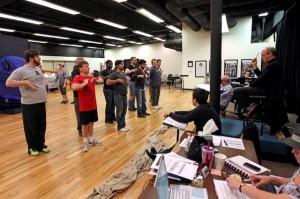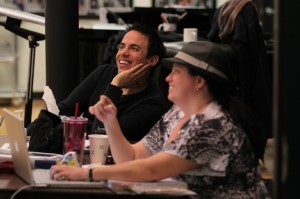Oompa Loompa, Pudding and Pie! Most of us might think of opera as Really Retro, but fans of the blissfully tart children’s book CHARLIE AND THE CHOCOLATE FACTORY by Roald Dahl and its iconic cinematic interpretation with Gene Wilder as enigmatic chocolatier Willy Wonka are in for a real treat. The Atlanta Opera is dipping into the 20th century for its 2011-12 season-opener, THE GOLDEN TICKET, with performances March 3, 6, 9 and 11, 2012 at the Cobb Energy Performing Arts Centre. Commissioned by the American Lyric Theater and Dahl’s widow, Felicity Dahl, THE GOLDEN TICKET serves up all the scrumptious delights familiar from the book, including chocolate rivers, inflating blueberries and magic elevators.
The Atlanta Opera production will be the third for THE GOLDEN TICKET which premiered in June 2010 at Opera Theatre of Saint Louis and was written by Donald Sturrock (libretto) and Peter Ash (music), who also composed a children’s opera of Dahl’s THE FANTASTIC MR. FOX. Many singers from the original Saint Louis cast will joing the Atlanta company to reprise their roles in Atlanta, including bass-baritone Daniel Okulitch as Willy Wonka/Mr. Know, tenor Andrew Drost as Augustus Gloop, and baritone David Kravitz as Lord Salt. In another treat, Composer Peter Ash will conduct. And don’t worry. You and the kids don’t need to brush up on your Italian, as the performers will sing in English with English supertitles projected above the stage.
ATLRetro recently caught up with the Atlanta Opera’s Michael Shell, who had the delicious opportunity to direct this opera of pure imagination, to find out more about how it will delight all ages.
ATLRetro: How did the Atlanta Opera come to perform THE GOLDEN TICKET?
Michael Shell: My understanding is that Dennis [Hanthorn, Zurich General Director of the Atlanta Opera] knew of the piece when he was in Milwaukee and wanted to produce it there. They never got to, and then when St. Louis decided to produce it, he came to see the production and wanted to bring it to Atlanta.
When the Tim Burton movie version of CHARLIE AND THE CHOCOLATE FACTORY came out a few years ago, a lot was made about it being closer to the book than WILLY WONKA & THE CHOCOLATE FACTORY (1971) and having the blessing of Felicity Dahl; yet a lot of people love the Gene Wilder version as an iconic part of their childhood. What can you say about THE GOLDEN TICKET’s relationship to the book and those two movies?
I think it is more closely tied to the book. With a few additional characters, Peter and Donald have tried to stay close to the narrative in the story while making changes to aid in bringing it to life onstage. In particular, the role of Charlie. When reading the book, the reader essentially becomes the character of Charlie. So in the opera, Peter and Donald, found a way to give Charlie a voice through his relationship with his grandparents. In his aria in Act I Charlie is observing his grandparents, all four sleeping in one bed because they can only afford one. He wonders what they must have felt like when they were young and if they also longed to, “escape far away into dreams…”
The physical production also took its inspiration from the book rather than the movies. There are words and letters hidden in the set. The set unit that is Charlie’s home spells out the word “HOME.” There are letters all over the set that gives us a unity that is tied to the written word. I think the best use of it is in the gates of the factory and also when those gates open. It keeps the audience engaged the same way they are when reading the story. It doesn’t tell you exactly what the factory looks like but allows you to see what you imagine to be the factory.
How does directing THE GOLDEN TICKET compare to directing classic operas?
Directing this piece is certainly one of the most exhilarating and terrifying things I have ever done. With shows that have a performance history, you can look at that history as a guide for what you want to do or what you don’t want in a production. With a new piece there is no blueprint. All you have is the score and the imagination of your collaborators. With this production having the composer as the conductor has given us amazing insight to meaning behind certain musical and dramatic moments. My approach though is the same regardless of the piece. I want to understand what the story is about or the theme of the story and how that theme relates to the characters. With this answered I can then go further into why characters behave and make the choices they do throughout the course of the opera.
What’s the score like?
The score is lyrical, beautiful, inventive and complex. But even in its complexity, it has a simple accessible style that makes it perfect both avid opera-goers and new audiences alike. The lyrics so skillfully crafted by Donald Sturrock are perfectly musicalized by Peter Ash that you are thrust into the story and the journeys of the characters. There is also plenty of humor that is brought out in the music. The grandparents’ snoring quartet is a prime example. Here are four people coming in and out of dreams, snoring and talking in their sleep. But as you can imagine four older people in one bed, there are bound to be other noises that occur. We have dubbed this quarter as the “gastric” quartet. This is the only opera that I have ever directed that I have had to instruct someone how to “pass gas.”
The description reads that “THE GOLDEN TICKET is a poignant tale about wishes coming true.” But there’s also a cautionary tale and quite a bit of dark humor in Dahl’s story. How does the opera approach the contradictions in the character of Willy Wonka and balance those two aspects?
I think the darkness is there both in the music but also in the portrayal of Willy himself. Daniel Okulitch is brilliantly cast in this role. His childlike curiosity mixed with his intelligence and depth of feeling make him the perfect Wonka.
Are there any particular scenes/segments that you think will particularly delight fans of the book and movie(s)?
I think our depiction of the oompa loompas will make fans of the movie happy. They are a unique take on these characters. Very unique to the opera is their attitude about life in the factory and life in general. They are, for me, the heart of the factory.
Apparently Donald Sturrock and Peter Ash, who created the opera, had a lot of trouble getting funding because the opera community had a problem getting a grip around an opera that would appeal to children. How have ticket sales been so far and are you concerned at all that your regular opera audience won’t embrace it for that reason?
I hope that people who are patrons of opera already come to this with an open mind. Very often people are turned off to new opera because they are comparing it to their favorite Puccini opera or their favorite Verdi opera. This comparison cannot be made nor would we make on Verdi if he were still composing today. As we evolve as a society, our expression in artistic endeavors will change. If we don’t begin to accept these new pieces on their own terms and evaluate them in terms of story telling etc rather than if they are as good as TOSCA, we will kill the future of new opera and potentially the art form in general.
Turning the question around, what do you say to people who love the book and movie(s) but are nervous that they won’t enjoy the story as opera?
Any story brought to life onstage is going to require changes to bring it to life for live theater. So I would ask these fans of the book and the movies to come with an open mind and to follow the words of Willy Wonka and “Imagine.”
I think this opera is perfect for both avid opera-goers and people who are new to opera And families. The complexity of the orchestration and score makes it interesting for a music lover. The accessibility of the music’s overall harmony makes it perfect for people who are new to modern opera. The humor and heart of the story make it perfect for all types of audiences including children.





